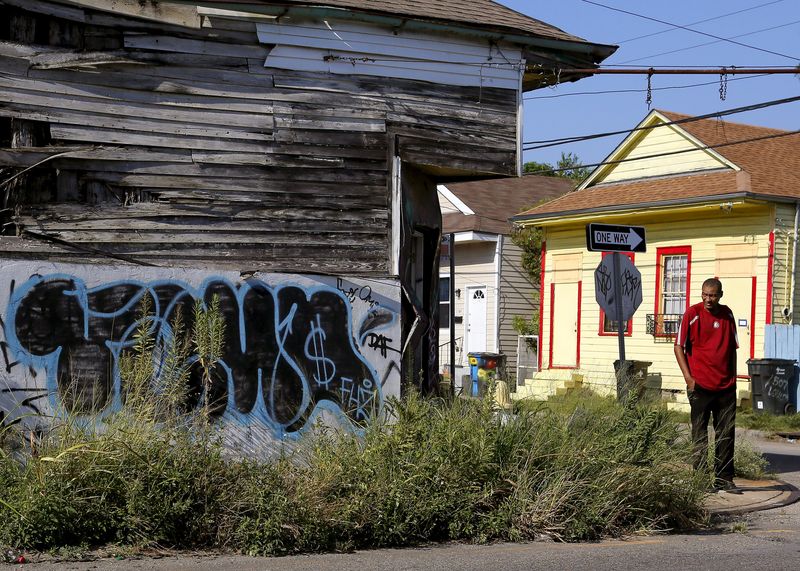By Kathy Finn
NEW ORLEANS (Reuters) - From the hardscrabble Lower Ninth Ward to middle-class Gentilly, thousands of abandoned homes still litter neighborhoods in New Orleans, a glaring reminder of the mass exodus of residents that followed Hurricane Katrina in 2005.A decade after the storm triggered flooding that damaged 70 percent of the city's housing stock, the most-blighted streets in town are still lined with boarded-up houses that pose safety hazards to residents who have repaired and rebuilt homes nearby.In the Lower Ninth Ward in particular, a 10-minute drive from the jazz clubs and bar of New Orleans' historic downtown, large swaths of vacant houses and overgrown lots shelter rodents and snakes amid pockets of recovery where entire blocks of dwellings have been renovated.
Residents complain the areas are not safe for children to play and that abandoned housing invites the illegal drug trade and other criminal activity, hampering further recovery."Nobody envisioned at the time of the storm that 10 years out there would still be very visible ramifications of the storm on the local landscape," said Peter Yaukey, a University of New Orleans professor who has surveyed the condition of damaged properties.By some estimates, nearly 44,000 New Orleans houses were considered blighted as of 2010, but the city had problems even before Katrina, with as many as 30,000 homes in some state of disrepair.Ryan Berni, a senior adviser to New Orleans Mayor Mitch Landrieu, said the city stepped up enforcement actions against property owners in recent years, and many owners responded by cleaning up their properties to comply with the law. But large problem areas remain.The vast portfolio of deteriorating houses in New Orleans runs counter to other signs pointing to an improbable rebound by the city from the devastation of late August 2005. Today the world-renowned French Quarter is buzzing with tourists, new restaurants abound and many neighborhoods are gentrifying.The blighted houses remain in part because of a tangle of bureaucratic red tape involved in selling them off. Before the city can sell a tax-delinquent property, state law requires the public and all owners to be notified and mandates waiting periods of up to three years. During that time, an owner could get back in the game by making a minimal tax payment."It's private property whose owners have left, and how you deal with that is a matter of property laws," Berni said.Many of homes in the Lower Ninth Ward were handed down through several generations and it is unclear who holds the deed.Jeffrey Hebert, who heads the New Orleans Redevelopment Authority, has overseen the disposal of about 65 percent of the 5,200 flooded properties handed over to his agency by a state housing assistance program called Road Home, which bought them from owners who decided not to return.He says the process of moving an abandoned dwelling toward a sale sometimes leads through a labyrinth of owners that can involve 10 or 12 different family members, some of whom may be deceased or not even in New Orleans any more."Just getting those properties to the point where they can be sold is extremely difficult," he said. Some properties were sold through auctions, and many others went through the Lot Next Door program, which offered vacant properties for sale at attractive prices to next-door neighbors who wished to enlarge their own properties.

Others were offered at a discount to non-profit developers who agreed to "green" the property with landscaping and create community gardens or more attractive home sites.Abandoned housing is easier to auction off in some neighborhoods, Hebert said. Properties in Lakeview sell quickly because it is a more prosperous neighborhood than the Lower Ninth Ward, several miles away, and it had a stronger real estate market before the storm."Getting neighborhoods like the Lower Ninth Ward back to where they need to be is a harder lift," he said.Alison Robinson, 55, has worked for years to restore a flooded home on Caffin Avenue in the Lower Ninth where she grew up. She owns the house with 14 relatives. "We never received any money to fix it because we had 15 names on the deed to the house," she said, referring to assistance from the Road Home program.The family can't afford the legal process to put ownership in one person's hands to qualify for assistance, she added.With help from a nonprofit organization, the family enclosed a backroom of the gutted house to create a tiny apartment where one of Robinson's brothers now lives."As far as the front of the house, we're still trying to get sheetrock and electricity," she said. The family is relying on fundraisers and volunteers to put the house in better shape.Meanwhile, New Orleans is stepping up its efforts to sell off its backlog of blighted properties. The city recently partnered with a title insurance company to hold online auctions that give bidders a break on outstanding taxes.The first two auctions moved 250 properties, Berni said. But that's a tiny fraction of the abandoned housing dotting the city.
(Editing By Frank McGurty)